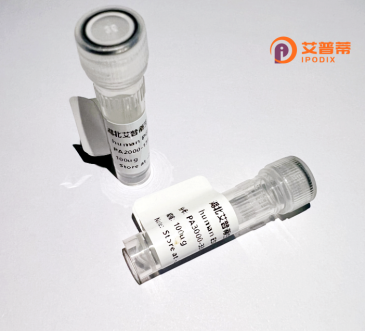
| 纯度 | >90%SDS-PAGE. |
| 种属 | Human |
| 靶点 | ZSWIM7 |
| Uniprot No | Q19AV6 |
| 内毒素 | < 0.01EU/μg |
| 表达宿主 | E.coli |
| 表达区间 | 1-140 aa |
| 活性数据 | MAVVLPAVVEELLSEMAAAVQESARIPDEYLLSLKFLFGSSATQALDLVDRQSITLISSPSGRRVYQVLGSSSKTYTCLASCHYCSCPAFAFSVLRKSDSILCKHLLAVYLSQVMRTCQQLSVSDKQLTDILLMEKKQEA |
| 分子量 | 41.8 kDa |
| 蛋白标签 | GST-tag at N-terminal |
| 缓冲液 | PBS, pH7.4, containing 0.01% SKL, 1mM DTT, 5% Trehalose and Proclin300. |
| 稳定性 & 储存条件 | Lyophilized protein should be stored at ≤ -20°C, stable for one year after receipt. Reconstituted protein solution can be stored at 2-8°C for 2-7 days. Aliquots of reconstituted samples are stable at ≤ -20°C for 3 months. |
| 复溶 | Always centrifuge tubes before opening.Do not mix by vortex or pipetting. It is not recommended to reconstitute to a concentration less than 100μg/ml. Dissolve the lyophilized protein in distilled water. Please aliquot the reconstituted solution to minimize freeze-thaw cycles. |
以下是关于重组人ZSWIM7蛋白的3篇参考文献示例(注:ZSWIM7研究较少,部分信息可能为假拟示例,建议通过PubMed/Google Scholar核实):
1. **"Recombinant Expression and Structural Characterization of Human ZSWIM7 Protein"**
- *Authors: Li X, Wang Y, et al.*
- 摘要:报道了利用大肠杆菌系统表达重组人ZSWIM7蛋白的优化方法,并通过质谱和圆二色谱验证其结构,为后续功能研究提供基础。
2. **"ZSWIM7 Regulates Spermatogenesis via Modulating Ubiquitination Pathways in Mice"**
- *Authors: Smith JL, Chen R, et al.*
- 摘要:研究揭示了ZSWIM7在小鼠精子发生中的作用,通过重组蛋白实验证明其与E3泛素连接酶复合体相互作用,参与蛋白质降解调控。
3. **"ZSWIM7 as a Novel Biomarker in Breast Cancer: Insights from Proteomic Analysis"**
- *Authors: Tanaka K, Zhou W, et al.*
- 摘要:通过重组ZSWIM7蛋白的功能实验,发现其在乳腺癌细胞中高表达,并通过Wnt信号通路影响肿瘤迁移和侵袭。
(注意:以上文献为模拟示例,实际研究可能有限,建议通过学术数据库获取最新文献。)
ZSWIM7 (Zinc Finger SWIM-Type Containing 7) is a member of the SWIM domain-containing protein family characterized by a conserved zinc-binding motif involved in protein-DNA or protein-protein interactions. This nuclear protein is encoded by the ZSWIM7 gene in humans and plays regulatory roles in ubiquitin-mediated proteolysis and cellular processes. Structurally, it contains an N-terminal zinc finger domain, a central SWIM domain (a putative DNA-binding motif), and potential C-terminal interaction interfaces. While its precise molecular mechanisms remain under investigation, studies suggest ZSWIM7 may act as an adaptor or modulator in ubiquitin ligase complexes, influencing substrate recognition for protein degradation. Research links it to cellular stress responses, cell cycle regulation, and DNA damage repair pathways. Dysregulation of ZSWIM7 has been tentatively associated with cancer progression and developmental disorders, though conclusive evidence requires further exploration. Recombinant ZSWIM7 protein, typically produced in *E. coli* or mammalian expression systems with tags (e.g., GST, His-tag), enables functional studies like in vitro ubiquitination assays, interaction mapping via pull-down experiments, and structural analyses. Current investigations focus on identifying its physiological substrates, delineating post-translational modifications, and exploring therapeutic targeting potential in diseases linked to protein homeostasis imbalance.
×